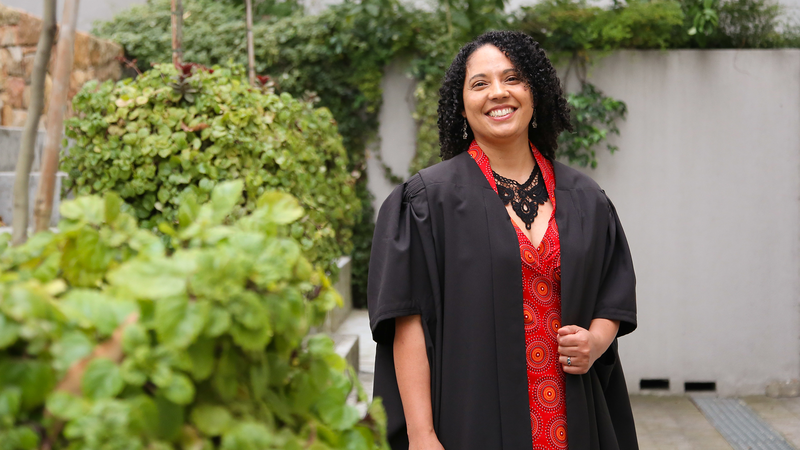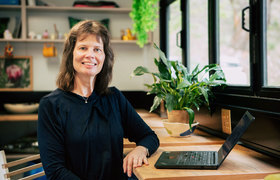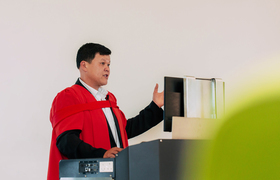Reflections from a surgeon in service of the community
06 November 2023 | Story Niémah Davids. Photos Je’nine May. Read time 8 min.“The world today is awash in pain and conflict – from Gaza to the gang-ridden streets of the Cape Flats. So, it’s easy to despair and it’s easy to be cynical. It’s much harder to hope and harder still to take action. But I urge myself and I urge all of you to take that hard route; to find a point [of access] in the place where you are, the place you have influence, the place where you can make a difference, and to act so that the world we leave our children is better than the one into which we were born.”
With these words, the University of Cape Town’s (UCT) Professor Lydia Cairncross concluded her gripping inaugural lecture that provided her in-person and virtual audience with a snapshot into the years of work that has led her into the professoriate.
Professor Cairncross is the head of the Department of Surgery at UCT and Groote Schuur Hospital (a UCT teaching hospital). Her lecture was titled: “From endocrine surgery to access to care – the imperative for health equity action in academic medicine”, a fitting title for a surgeon and community activist whose commitment to social justice is unwavering, and whose work doesn’t end in the operating theatre. On weekends you’ll find her on the ground in the township teaching the community about cancer and engaging in discussions and debates on human rights.
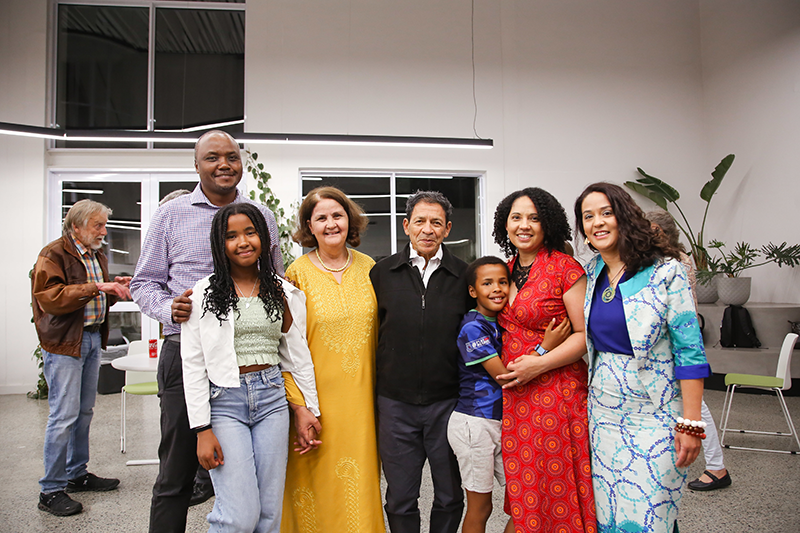
Delivering the introductory remarks of the evening, Professor Graham Fieggen, the head of UCT’s Neuroscience Institute, spoke fondly of Cairncross. His comments also included anecdotes from colleagues, mentors and mentees who have worked with her over the years. And their sentiments were unanimous: she’s a brilliant surgeon, an advocate for primary healthcare, and an inspiration to her students, her peers and the marginalised members of society.
Becoming a surgeon
It was UCT’s former head of the Department of Surgery, Professor Delawir Kahn’s, “profound influence” that led Cairncross to a career as an academic surgeon in a university teaching hospital. And her daily schedule has been rigorous ever since. Apart from its primary function (performing surgery on patients), teaching, training and research also form part of the job. Over the years, the latter has led her to publishing multiple academic research papers in renowned medical journals.
“I wanted to be a district surgeon, doing the work close to the people in a small hospital.”
“I wanted to be a district surgeon, doing the work close to the people in a small hospital. [But] Professor Kahn said: ‘No, it’s a bad idea. You should do academic medicine.’ I have to concede that you were right, Professor Kahn,” she said. “It was the right thing to do because [back then] I hadn’t realised the reach of a university and an academic career.”
Cairncross described her days as a surgical registrar as exhausting. Yet, she said, it’s also a special time in the career of all training surgeons. It’s during this time when young surgeons are introduced to the “thrill” of saving someone’s life. And in time, they go from performing small operations, to bigger and more complex procedures.
“Eventually, you are actually the person who made a difference between life and death, and it’s quite thrilling. And, of course, we’re awake when everyone is asleep, and we walk the corridors. And there’s a mantra: you sleep when you can sleep and you eat when you can eat,” she said.
However, despite the challenges, she said, young surgeons can easily make these circumstances work if they feel valued, included, and like they belong.
Combining art and science
Once she passed her specialisation, she was tasked with deciding which area of surgery she wanted to specialise in. And after some thought, Cairncross opted for endocrine breast and sarcoma surgery. She described this area as an interesting mix of very delicate and big operations to remove various tumours.
“We arrange, rearrange and reconstruct breasts that have gone wrong. And when we’re fully there in that moment, there’s a flow and focus which make surgery a combination of art and science,” she said. “We are holding that patient literally in our hands, and that immense responsibility and trust the patient places in us is something we need to hold sacred.”
But what ensures the patient’s safety while on the operating table? It’s a complex combination of things that ultimately comes down to the relationship between the surgeon and the patient. Understanding their pathology and having insight into their needs; being mindful of the number of risks they would want the surgeon to take during the operation and getting an idea of what the patient understands about their recovery and healing post-procedure are equally important.
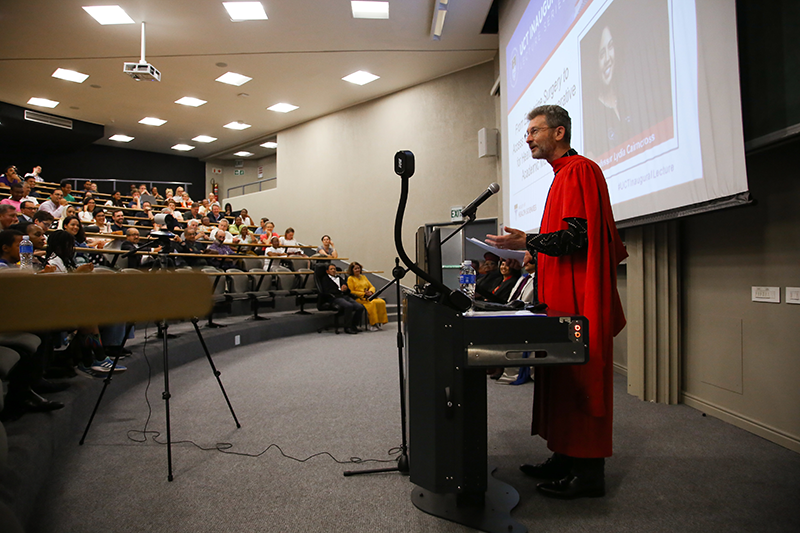
More than that, she said, surgeons cannot fulfil their duties without a well-equipped team – anaesthetists, scrub sisters, anaesthetic nurses, colleagues who ensure that the surgical instruments are cleaned, porters who transport the patient to and from theatre, the theatre-cleaning team, as well as the administration staff in the wards all have a role to play in the process.
“In order to do surgery safely, you need a functional health system [and] that makes it very difficult to do safe surgery. But it also means that if you get it right, it will help the whole system, the whole health system to rise, to be better and to be as good as it could possibly be for our patients,” she said.
Teaching, learning, leading
It’s been just 10 months since Cairncross took over the reigns as the head of the Department of Surgery. While she was not convinced about accepting the job, she did because she understands the power of education and what it imparts through teaching and learning, and research.
“When we teach well, we develop a subtle form of immortality because people remember the way we do things, and what we have taught reverberates generations down the line.”
“When we teach well, we develop a subtle form of immortality because people remember the way we do things, and what we have taught reverberates generations down the line. So, there is truly joy in teaching,” she said.
But there’s a bit more to the job than that. Executing good leadership, juggling bureaucracy, managing staff effectively, and ensuring the correct administration processes are in place so that the department can operate like a well-oiled machine, form part of her daily routine. But with the right tools in place, and empathetic leaders, making a difference is possible.
“For me, leaders need to ensure that things run well and that things run smoothly because if they don’t run well, you can’t steer the ship anywhere if the ship is sinking. So, we need to fix the things that don’t work well,” she said.
Part of Cairncross’s lecture also included a snapshot of her work as an activist, working alongside the Treatment Action Campaign to break the stigma associated with HIV/AIDS; adding her voice to proposed provincial hospital budget cuts in the early 2000s; and her ongoing work with The People’s Health Movement of South Africa – an advocacy organisation dedicated to improving healthcare and health-related services for all.
 This work is licensed under a Creative Commons Attribution-NoDerivatives 4.0 International License.
This work is licensed under a Creative Commons Attribution-NoDerivatives 4.0 International License.
Please view the republishing articles page for more information.


